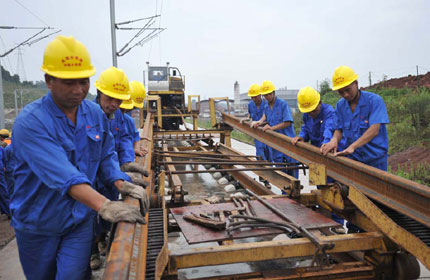Fiscal, tax system reform a breakthrough
Updated: 2014-07-11 17:32
(chinadaily.com.cn)
|
|||||||||||
The fiscal and tax system reform is seen as the breakthrough in pushing the modernization of Chinese government's administrative ability and is also the key influence of the overall reform.
China's fiscal system reform is in its core a 'delegation of power'. On one hand, the government steps out from the competitive fields through the market reform and the construction of modern economic system so that the resources in those fields can be better allocated and decided by price and competition forces. On the other hand, central government starts to delegate powers to local governments so that they gain more decision-making power.
However, the power delegation is not thorough because first of all, the local governments are not endowed with the tax rights; secondly, the power delegation is not balanced on a local level which means that it's not built on a public fiscal structure and is only a power division under a hierarchy management system. The debt and financial risks accumulated under a non-transparent environment poises periodical threats to macro economy.
The conflict between fiscal income and spending
Local governments are searching other financial sources to balance income and expenditure under the excessive 'GDP competition' and 'land finance' is the common methodology that they adopt. During 2003 to 2012, land leasing contributed to 52 percent of local fiscal revenue and the highest point was 72 percent in 2010. 11 property-related taxes contributed 31 percent to local governments' fiscal revenue in 2012 which amounted 1,900 billion yuan. In China where land is scarce, the extensive land expansion results in humongous debt behind local governments' glorious-looking GDP growth which also backfires at them with a vicious circle.
The competition of financial rights ownership between central and local government also affects the efficiency of capital allocation. Local governments often shift their control over financial resources especially the credit resources in local banking system which results in the rise of non-performing loans and the decline of efficacy of capital allocation.
Financial resources vs governance
Priority of the new fiscal reform will be given to building a system that balances financial resources and governance. Tax reform, budget reform and fiscal system reform will be placed as the top three breakthroughs.
The urgency of cultivating new taxes main body needs to be put in priority. In the 28 taxes in China, 18 of them are put under local authorization. However, those tax funds are scattered and hard to collect and manage. Sales tax, business income tax and individual income tax are stable sources but as sharing taxes, they can not be used as main taxes on local level. The new tax system needs to be designed to cultivate main taxes categories for local governments. Only through deepening the taxes distribution below provincial level can we solve the problems such as asset allocation distortion and low efficiency.
Secondly, a new budget managing system will be the main push of the fiscal system reform which includes not only capital in budget but also outside. To insure the balance of fiscal income and spending, adjusting power and spending responsibilities between central and local governments in a rational manner are much needed. A transparent fiscal channel needs to be built to balance among general budget revenue, government fund budget, state-owned capital management budget and the social security budgets.
Using the government financing system reform as a breaking point to transform current situation is also important in fiscal reform. The current system is built on local government financing platform mainly and holds land reserve in pledge. It's a government financing mode which relies highly on bank credit. Finding a new source for local government income to replace the 'land financing' can contribute greatly to building a modern fiscal system.
The author Zhang Monan is a deputy researcher in China Center for International Economic Exchanges (CCIEE)
Related Stories
Capital market reform catalyst for China's restructuring 2014-07-03 10:52
Timetable set for new fiscal system: minister 2014-07-07 09:46
New finance, tax reforms should strike a balance 2014-07-09 08:51
Central bank chief highlights China's financial risks 2014-06-25 10:13
Needed: A 'strong' Chinese economy 2014-07-08 07:30
China on path to modern fiscal system 2014-07-10 11:09
Today's Top News
Berlin expels top US spy from Germany
Israelis hint at invasion of Gaza
Market to 'decide' yuan rate
Lotteries win big on World Cup
Italian EU Presidency: pushing for greater unity
Van Gaal: I taught Romero how to stop penalties
Snowden files asylum extension
Israel steps up offensive, 53 die
Hot Topics
Lunar probe , China growth forecasts, Emission rules get tougher, China seen through 'colored lens', International board,
Editor's Picks

|

|

|

|

|

|





